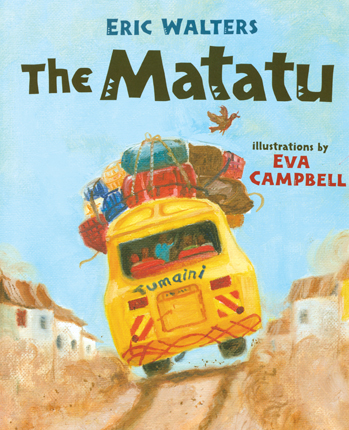| Matatu Author: Walters, Eric | ||
| Price: $6.50 | ||
Summary:
A young boy takes a ride on the matatu bus with his grandfather for his fifth birthday, and along the way his grandfather tells him the story of why dogs chase the bus, goats run from it, and sheep pay no attention to it.
| Illustrator: | Campbell, Eva |
| Accelerated Reader Information: Interest Level: LG Reading Level: 3.60 Points: .5 Quiz: 150525 | Reading Counts Information: Interest Level: 3-5 Reading Level: 2.80 Points: 3.0 Quiz: 57160 | |
Reviews:
Kirkus Reviews (03/15/12)
School Library Journal (00/05/12)
Booklist (05/15/12)
The Bulletin of the Center for Children's Books (00/07/12)
Full Text Reviews:
School Library Journal - 05/01/2012 K-Gr 2—In this congenial tale of daily life in Kenya, Kioko celebrates his fifth birthday by taking a special bus ride with his grandfather. The matatu is a colorful, overloaded bus that the child has longed to ride. He wonders why barking dogs always chase it, and his grandfather tells him a simple tale explaining why. Walters adds a closing note for adults about the local practices of the matatu and its driver and conductor. The short story that grandfather tells is an adaptation of a Kamba folktale, and an opening note by the director of the Kenyan organization Creation of Hope explains that the author has been made a Kamba elder, which gives him the right to tell this tribally owned tale. Campbell uses lightly brushed oil paints to sketch the yellow bus, its multitude of passengers and luggage, and the passing terrain. The enjoyable view of life in this faraway country beautifully frames a universal special relationship between a child and a grandparent. Children and adults will smile at Kioko's concluding action in response to his grandfather's tale. With considerable conversation between Kioko and his grandfather, the text is a bit long and detailed for reading aloud to groups, but the book should be widely appealing and useful.—Margaret Bush, Simmons College, Boston - Copyright 2012 Publishers Weekly, Library Journal and/or School Library Journal used with permission.
Booklist - 05/15/2012 With a wry mix of realism and folklore, Walters draws on his work in rural Kenya to tell the story of Kioko, who, for the first time, on his fifth birthday, gets to ride the crowded matatu, a public bus that transports people and goods. Campbell’s bright, mischievous watercolors show the passengers on the crowded seats with the conductor picking his way down the aisle collecting fares, along with close-up images of Kioko as he listens to his beloved grandpa tell a story while they drive through dusty roads past huts, houses, and market stalls. Along with the vivid setting, there is a playful story based on a Kamba folktale. Why do dogs always chase matatus? Why do sheep ignore the bus? Why do goats run away? It turns out that there is a past history of unpaid debts, so the boy tries to settle things. The bond between Kioko and his grandpa will grab kids, and so will the sly twist when the boy tries to fix things and change the old folktale. - Copyright 2012 Booklist.
Bulletin for the Center... - 07/01/2012 Today is Kioko’s fifth birthday, and in honor of the occasion his grandfather is taking him for his very first ride on a matatu, the bus that provides public transportation in rural East Africa. Following his grandfather’s directive to “watch for goats and sheep as well as dogs,” Kioko observes that the goats always hide from the matatu, the dogs always chase the matatu, and the sheep simply watch the matatu passing. Grandfather then tells Kioko a folktale about a time when animals were paying passengers on the matatu that provides an explanation for the very behaviors that Kioko noticed. Canadian author Walters, who runs a organization that helps Kenyan orphans, does an exemplary job of providing a cultural snapshot of Kioko’s world. The affection between Kioko and his grandfather is effectively captured in Campbell’s lively oil paintings, which also depict a dynamic, color-filled village and expressive villagers. The volume is a bit on the text-heavy side, making it a rather long readaloud, but the pacing and the appealing illustrations should hold listeners through to the end. An author’s note provides an animated depiction of what it’s like to ride a matatu. HM - Copyright 2012 The Board of Trustees of the University of Illinois.



